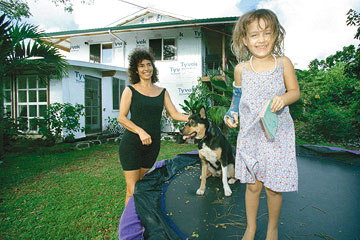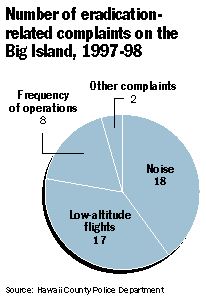"This whole thing made me open my eyes. This is not paradise. This is not even a free country. It's a war zone." Orchidland Estates retiree Gisella Coleman, who had her home searched by police looking for marijuana which they did not find |

Judith Mura and her daughter, Jordan, enjoy the backyard of their Puna home. but their lives are disrupted by helicopters looking for marijuana plants, Mura says.
Judith Mura hacks away at the foliage choking her property, the land on which she has built a house for herself and her 5-year-old daughter, Jordan. Mura cleared her half-acre lot of lava boulders, which she lifted one by one to form a rock wall 6 feet high. She even built Jordan a playhouse, which she painted white and decorated with little-girl ruffles and trim. Rock by rock, nail by nail, the 46-year-old single mother is creating a life for herself and her daughter out of the rough-but-quiet Puna landscape. Then the drug enforcement helicopters come, searching for marijuana plants. Sometimes they fly 12 feet over her house, Mura said, so low they shake the roof and walls. Sometimes the rattling and noise gives Jordan nightmares for a week. Mura isn’t involved in Hawaii’s pakalolo industry, but the statewide Counter Cannabis Field Operation nevertheless has drawn her in. “I don’t smoke pot, and I don’t care about pot whatsoever,” she said. “I’m not pro-hemp or pro-marijuana. I have nothing to do with marijuana, and yet this is a war involving me. These helicopters come right in my face.” When Operation Green Harvest began in 1976 — 12 years before Mura moved to Puna — the area was so open that the Hawaii Army National Guard’s Huey helicopters could land in the middle of almost any road and not bother anyone. “When we first started with the Hueys, there was nobody out there,” said Big Island police Capt. Dale Fergerstrom, who started with Operation Green Harvest as a foot patrolman. “There were huge tracts of no houses.” Residents complain In the past 20 years, people have poured into Puna, attracted by cheap, plentiful land. They have more than doubled Puna’s population to more than 27,000 people. They began complaining about the noise and intrusion of helicopters. Police imposed their own minimum flying altitude of 500 feet, except to pick up and drop off officers to cut down marijuana plants. Some residents still aren’t happy. In 1997 and 1998, Big Island police received 45 complaints about their marijuana eradication operation. Eighteen were over helicopter noise, and 17 concerned low-altitude flights. Sometimes people confuse fire department, air ambulance or tour helicopters for police and National Guard helicopters, said Lt. Henry Tavares. He is in charge of marijuana eradication for the eastern half of the Big Island. Tavares tries to remind residents how the war on marijuana is making their lives better. He illustrates his conversations with the crude devices police have found — spring-loaded animal traps, fishing line strung with hooks, and shotgun shells and bullets that can be triggered by trip wire. The only person injured in the past 24 years was a marijuana grower in a Puna papaya field. He blew off his hand while loading a booby trap designed to fire a shotgun shell. But any child, hiker or family pet could trigger the booby traps, Tavares said. He asks longtime residents to remember the 1970s and 1980s, when telephone and power workers were fired upon, and innocent people were threatened by growers. “We’re getting rid of booby traps, getting rid of the risk of kids running into them,” Tavares said. “We explain that we’re making their neighborhoods a safer place.” Keeping promises Rene Siracusa is hardly “anti-cop,” as she puts it. As president of the Puna Outdoor Circle, she has landscaped the front of the Pahoa police substation and helped with community policing operations. When Siracusa complained to the Big Island police about the helicopter flights, “They said they wouldn’t fly over my house if I promised never to grow marijuana,” she said. “To this day, I’ve kept that promise, but they haven’t kept theirs.” There have been days when Siracusa watched the sky above her 9-acre Kaohe Homesteads property in Puna and logged eight helicopter flights. They have so terrified Siracusa’s animals that three of them died while trying to get away, Siracusa said. Sir Loin, Siracusa’s year-old, 500-pound bull, panicked and kicked her in the hip in 1985 while a police helicopter hovered overhead, she said. Three years ago, Siracusa said, police helicopters frightened Sir Loin again. He broke free and ran into the nearby forest trailing 50 feet of rope, which got tangled in the woods and strangled him. “He was normally a very placid animal, but the helicopters harassed him,” Siracusa said. A 9-month-old goat was so terrified by helicopters that she ran in circles around a clump of grass until there was no slack in the rope and she strangled herself. A 7-month-old goat frightened by helicopters broke her neck, Siracusa said. In 1989, when Siracusa was 50 years old, a police helicopter flew so low that “I hit the dirt and ended up breaking my wrist.” “I can’t help getting angry,” said Siracusa, now 61. “I’m a law-abiding citizen, and it hasn’t done me any good. They’re creating what feels like a war zone, and innocent people and animals get hurt.” ‘I am outraged’ Gisella Coleman was visiting a neighbor in March 1997 when five police cars came bouncing down the pitted and unpaved road that runs in front of her home in Orchidland Estates, a rural Puna subdivision. Coleman followed the cars as they drove up to her house and was surprised when police served her with a search warrant. “The person in charge was really disappointed,” said Coleman, a 62-year-old retiree. “I was not the kind of person he expected. They really wanted to find a pot grower.” The officers said a vice detective flying in a marijuana eradication helicopter, using infrared surveillance equipment, had spotted 2-foot-tall marijuana plants growing on her property. Coleman swears she has never seen marijuana in her life, let alone grown it or smoked it. She’s from Germany and can’t say the word “marijuana” without it coming out “merry-ahna.” “They came here and scared me,” Coleman said. “I used to believe that if I did not grow marijuana I had nothing to worry about. But I have learned that even if I don’t know what a marijuana plant looks like I have plenty to fear. ... I am outraged that the police want my tax dollars to bully me.” The officers had Coleman wait in the rain while they searched her 3 acres of land and went through the two houses on it. “They came inside with mud on their boots and dirtied my carpets,” she said. “They opened the closets. They opened the drawers. They went through all of my things.” After 10 or 15 minutes, the officers said they didn’t find any marijuana. Coleman filed a claim against the county and won $1,500. All of it went to pay her attorney fees, she said. To this day, Big Island police insist they saw marijuana growing on her property. “We’re not saying she was growing it, but somebody had marijuana there,” Lt. Tavares said. Coleman and her husband, Fred, moved to Puna from Europe in 1990 because they wanted to retire in a peaceful community that they had heard was paradise. “We have lived in police states, and we didn’t want to retire in one,” Coleman said. After Big Island vice officers searched her house, Coleman had trouble sleeping for weeks. And she became more aware of the complaints over the Counter Cannabis Field Operation going on around her. “This whole thing made me open my eyes,” she said. “This is not paradise. This is not even a free country. It’s a war zone.”
|
|||||||||||||||||||||||||||||||||||||||||||||||
 PUNA PALISADES, Hawaii — Welcome to suburban America, Puna-style.
PUNA PALISADES, Hawaii — Welcome to suburban America, Puna-style.